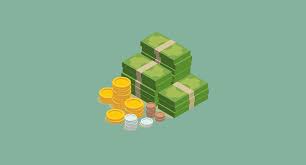
The money market is a component of the economy that provides short-term funds. It is associated with trading with very short-term debts investments. At the wholesale level, it involves large-volume trades between institutions and traders. At the retail level, it includes money market mutual funds bought by individual investors and money market accounts opened by bank customers.
How does money market work

A money market account is essentially a hybrid between a checking and savings account. It lets you write a limited number of checks each month and sometimes make debit purchases. And your money will earn a higher interest rate in a money market than it will in a checking or savings account.
Money market instruments

Large corporations with short-term cash flow needs can borrow from the market directly through their dealer while small companies with excess cash can borrow through money market mutual funds. Individual investors who want to profit from the money market can invest through their money market bank account or a money market mutual fund. A money market mutual fund is a professionally managed fund that buys money market securities on behalf of individual investors.
Instruments used in the money market include:
- Treasury Bills

Treasury bills are considered the safest instruments since they are issued with a full guarantee by the government. They are issued by government’s Treasury regularly to refinance Treasury bills reaching maturity and to finance the government’s deficits. They come with a maturity of one, three, six, or twelve months.
Treasury bills are sold at a discount to their face value, and the difference between the discounted purchase price and face value represents the interest rate. They are purchased by banks, broker-dealers, individual investors, pension funds, insurance companies, and other large institutions
- Commercial paper

Commercial paper is an unsecured loan issued by large institutions or corporations to finance short-term cash flow needs, such as inventory and accounts payables. It is issued at a discount, with the difference between the price and face value of the commercial paper being the profit to the investor.
Only institutions with a high credit rating can issue commercial paper, and it is therefore considered a safe investment. Individual investors can invest in the commercial paper market indirectly through money market funds. Commercial paper comes with a maturity date between one month and nine months.
- Certificate of Deposit

A certificate of deposit (CD) is issued directly by a commercial bank, but it can be purchased through brokerage firms. It comes with a maturity date ranging from three months to five years and can be issued in any denomination.
Most CDs offer a fixed maturity date and interest rate, and they attract a penalty for withdrawing prior to the time of maturity. Just like a bank’s checking account, a certificate of deposit is issued by banks and financial institutions.
- Banker’s acceptance

A banker’s acceptance is a form of short-term debt that is issued by a firm but guaranteed by a bank. It is created by a drawer, providing the bearer the rights to the money indicated on its face at a specified date. It is often used in international trade because of the benefits to both the drawer and the bearer.
The holder of the acceptance may decide to sell it on a secondary market, and investors can profit from the short-term investment. The maturity date usually lies between one month and six months from the issuing date.
- Repurchase Agreements

A repurchase agreement (repo) is a short-term form of borrowing that involves selling a security with an agreement to repurchase it at a higher price at a later date. It commonly used by dealers in government securities who sell Treasury bills to a lender and agree to repurchase them at an agreed price at a later date.
The Federal Reserve buys repurchase agreements as a way of regulating the money supply and bank reserves. The agreements’ date of maturity ranges from overnight to 30 days or more.
Functions of the money market

The money market contributes to the economic stability and development of a country by providing short-term liquidity to governments, commercial banks, and other large organizations. Investors with excess money that they do not need can invest it in the money market and earn interest.
Here are the main functions of the money market:
- Financing Trade
The money market provides financing to local and international traders who are in urgent need of short-term funds. It provides a facility to discount bills of exchange, and this provides immediate financing to pay for goods and services.
International traders benefit from the acceptance houses and discount markets. The money market also makes funds available for other units of the economy such as agriculture and small-scale industries.
- Growth of Industries
The money market provides an easy avenue where businesses can obtain short-term loans to finance their working capital needs. Due to the large volume of transactions, businesses may experience cash shortages related to buying raw materials, paying employees, or meeting other short-term expenses.
Through commercial paper and finance bills, they can easily borrow money on a short-term basis. Although money markets do not provide long-term loans, it influences the capital market and can also help businesses obtain long-term financing. The capital market benchmarks its interest rates based on the prevailing interest rate in the money market.
- Central Bank Policies
The central bank is responsible for guiding the monetary policy of a country and taking measures to ensure a healthy financial system. Through the money market, the central bank can perform its policy-making function efficiently.
For example, the short-term interest rates in the money market represent the prevailing conditions in the banking industry and can guide the central bank in developing an appropriate interest rate policy. Also, the integrated money markets help the central bank to influence the sub-markets and implement its monetary policy objectives.
- Commercial Banks Self-Sufficiency
The money market provides commercial banks with a ready market where they can invest their excess reserves and earn interest while maintaining liquidity. The short-term investments such as bills of exchange can easily be converted to cash to support customer withdrawals.
Also, when faced with liquidity problems, they can borrow from the money market on a short-term basis as an alternative to borrowing from the central bank. The advantage of this is that the money market may charge lower interest rates on short-term loans than the central bank typically does.
